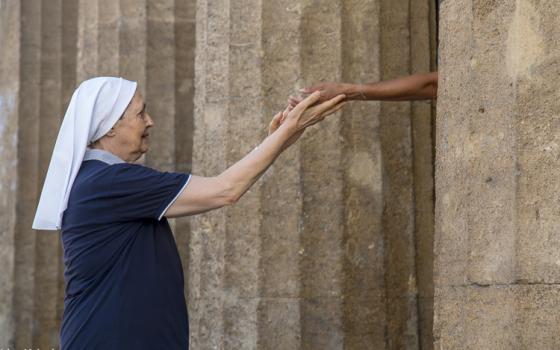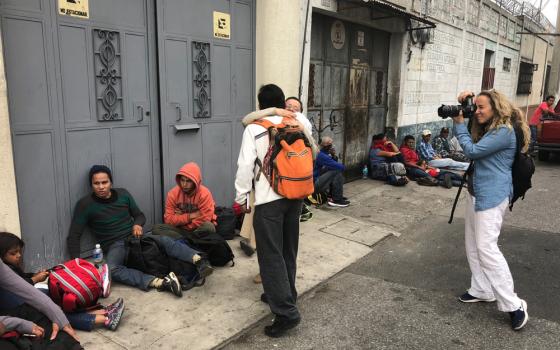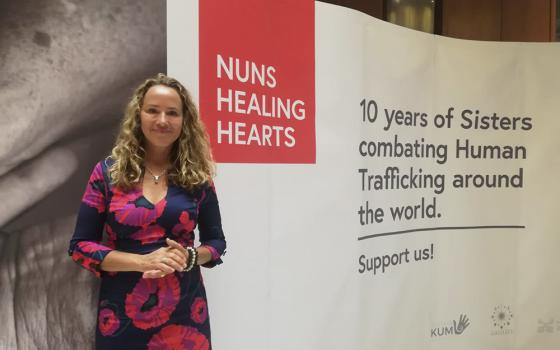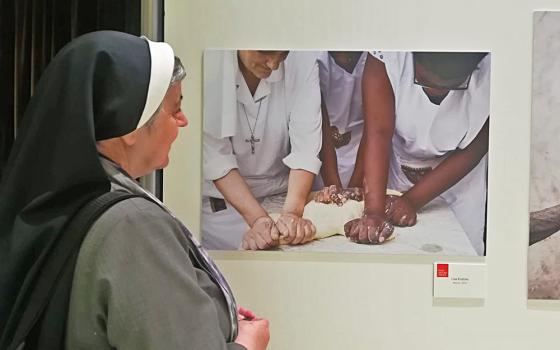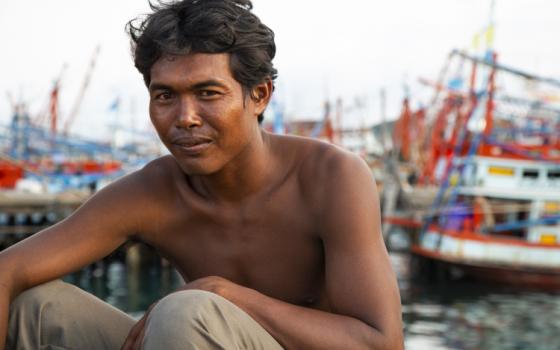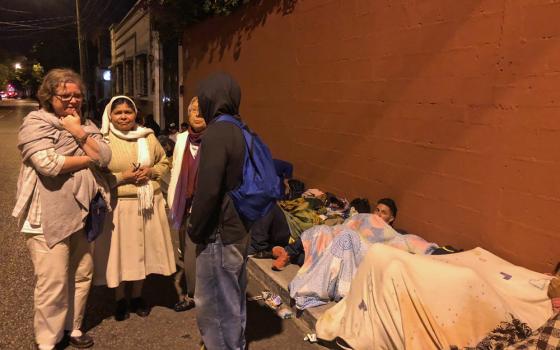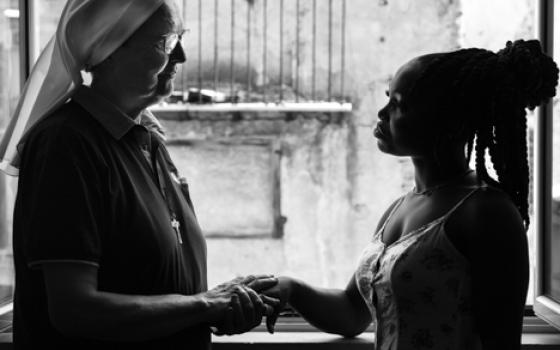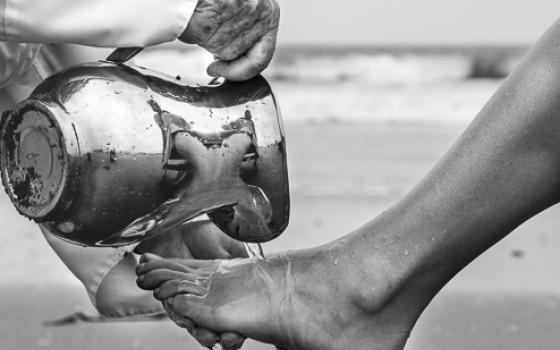Editor's note: Global Sisters Report is focusing on the efforts of sisters to end human trafficking as Talitha Kum, the international anti-trafficking network of religious, marks its 10th anniversary and launches its Nuns Healing Hearts campaign. The special series will run periodically through September, when Talitha Kum will hold its first general assembly. Since its founding in 2014, GSR has dedicated a section of its coverage to sisters who in various ways fight human trafficking. Read all of our coverage.
A group of Central American migrants followed Sr. Lorena Jiménez to the train tracks, preparing to climb atop the stationary trains just outside the migrant shelter she runs in Ixtepec, Mexico.
Though this was not a new activity for the Guardian Angel sister, she was still outside her comfort zone: On this trip, she was drawing attention to the issue of trafficking through a photo shoot with Lisa Kristine, an international humanitarian photographer.
Jiménez and her fellow sisters in Ixtepec are members of Red Rahamim, the anti-trafficking group for sisters in Mexico. Their network and 42 others belong to Talitha Kum, an international network of networks that spans 77 countries and connects sisters dedicated to the fight against human trafficking.
To celebrate its 10th anniversary, Talitha Kum helped Kristine photograph sisters in this ministry around the world. The effort was sponsored by the Galileo Foundation, which works to "strengthen the institutional capacity of the church," with one area being anti-trafficking, said John McCaffrey, the foundation's president.
Known as the Nuns Healing Hearts campaign, Kristine's photo exhibit was unveiled to Pope Francis on May 10, just before he addressed about 850 sister leaders of congregations gathered for the Union of International Superiors General assembly.
Francis "got quite emotional" when reviewing the photos, McCaffrey said. He also blessed the exhibit and signed three of the photos.
"We are discovering God through a different point of view, the artistic point of view," said Comboni Missionary Sr. Gabriella Bottani, the international coordinator for Talitha Kum who introduced Kristine to sisters around the world.
This project, she said, makes "the beauty of God visible in the pain and trauma of trafficking."
Walking with Pope Francis as he viewed the photos "was a deep experience of sisterhood [and] brotherhood, because the impression I had is that we are working with a brother," Bottani said. "Pope Francis is really very into these issues, so we are speaking about the reality of trafficking in a very different place where Lisa portrayed the work of the sisters. At the very end, he expressed his thank you for the work of the sisters, that he knows about our work and he's very supportive. For us, it is very important to get that message."
The photos were exhibited just for the day outside the audience room where Francis met with superiors general and will be moved to the UISG offices. They will be displayed July 30 at the United Nations in New York City for World Day Against Trafficking in Persons. The exhibit may be displayed at other locations, but the primary focus will be online. The campaign will raise money for Talitha Kum through the sale of photographs and donations.
Capturing sisters' worldwide work
From the beginning, Bottani said, it was important for the exhibit to showcase a diversity of locations and contexts.
With the Galileo Foundation offering its resources and with Bottani's coordination, Kristine photographed sisters working in sexual and labor exploitation as well as in prevention work with vulnerable migrants in Thailand, Italy, the United States, Mexico, Guatemala and the Philippines in 2018 and early 2019.
"It's always touching for me to get in touch directly with survivors and the sisters," said Bottani, who traveled with Kristine to a few of the destinations. "I'm really impressed with the conditions that we're working in, the power and courage that sisters have in many parts of the world."
"Some live in more isolated places and share their lives with these people, staying with them, never getting tired, returning every day," she said. "We do not have money, but we go there, and at least we're present. This, for me, is always powerful."
For example, when Bottani and Kristine went to Sicily in 2018, sisters mainly worked with North African migrants, typically from Libya. Ideally, sisters met them right as the migrants got off the boat, though sometimes they find them in areas where they're forced to sell their bodies to pay off the journey. Food, shelter, health care, prayers, a way out — sisters offer whatever they can, Kristine said.
Those who have been trafficked or forced to have sex, Kristine said, might experience trauma that makes their presence inconsistent, suddenly fleeing and coming back to the sisters, who still help them find jobs or housing.
"The sisters had absolute patience and met them where they were, and I thought that was beautiful," she said. "They didn't put further shame and self-persecution on the individuals for flaking out. They would just pick up and go again."
Part of this project, Kristine said, is capturing the relationship between people on the move and the heightened vulnerability to trafficking that comes with it.
"People running out of money, a family member dying or a child getting lost — the chaos is where the traffickers come in because people are in a vulnerable state with little resources," Kristine said. "They want to believe in someone who is claiming they will help them when what they are doing is exploiting them. And the nuns teach them about that."
Kristine's last stop was in the Philippines, where she met sisters who set up safe houses for children who had been trafficked or children who were pulled out of their homes where their mother was being trafficked "or prostituting herself in the same room as the child," Kristine said. The houses were intended to keep the kids safe but also provide them with "joy and a fun environment," she said.
These sisters also met families who were sleeping on the streets and educated them about the dangers of trafficking, warning them that traffickers could easily take their children in the middle of the night.
Establishing the partnership
Less than three years old, the Galileo Foundation focuses on human trafficking, interfaith work, the Holy See, the Holy Land, and the environment.
"We like to do things that add value or might be small but quick and effective," McCaffrey said.
In June 2017, McCaffrey met Kristine at a conference in Malta, where she was presenting an exhibition of her art photography, "ENSLAVED, A Visual Story of Modern Day Slavery."
The two chatted after her presentation, and Kristine showed him her work.
"I saw the photographs and thought, 'Wow, isn't this kind of what we're doing in the church already?' " he said.
Wondering how they could utilize Kristine's work, McCaffrey spoke with Fr. Michael Czerny, the undersecretary of the Migrants and Refugees Section of the Vatican Dicastery for Promoting Integral Human Development.
After speaking with Pope Francis, Czerny told McCaffrey about Talitha Kum, a project of the International Union of Superiors General, or UISG. With the network's anniversary in mind, McCaffrey said Czerny told him, "These sisters have done amazing, sterling work largely unrecognized around the world."
McCaffrey then met Bottani, initiating the partnership.
Kristine was "called to give sense to this story, to tell the story through her amazing pictures of the sisters on the ground," McCaffrey said.
McCaffrey said the goals for the partnership between Talitha Kum and the Galileo Foundation are twofold: to raise awareness around the prevalence of human trafficking and to extend the network and fundraise for Talitha Kum.
"I'm still coming across people every day in the developed world who don't believe that modern slavery exists, that in every town, city, and flight, there is trafficking going on," he said. The problem has gotten so large "that anything we can do to show that reality has got to be important."
With the exposure, Talitha Kum hopes to recruit more sisters and congregations to join its global network and raise money to develop various digital projects and help victims find homes.
Kristine said she's excited to spotlight sisters involved in Talitha Kum.
"They are a lesson to virtually any of us, to know that we are all capable of lending a dollar, a voice, a hand, or food — anything to help another human being without it meaning anything more than to help somebody," she said.
Showcasing 'reservoir of strength and goodness'
"If you want to get something done, and you want it to get done in the most cost-effective way, get a nun to do it," McCaffrey said. "You couldn't find a better partner. They don't waste any money, they are very clear in their purpose, and they don't do anything unless they're clear about the outcome."
Kristine, who was working with sisters for the first time, said they have "this unending reservoir of strength and goodness and desire to help. They do a lot with very little."
"It's an honor to have spent time with them, to have seen the work they do and to see the results of the work they do. I know Pope Francis is fond of these nuns, but to be able to share with him the work they do so that he can see the images — that's so exciting," said Kristine, whose Human Thread Foundation is partnering with the Galileo Foundation for the physical exhibit.
A month or two after the Vatican exhibit, McCaffrey said a "radical" second phase of this anti-trafficking campaign will roll out, one with a more "millennial approach," though the details of it will remain secret until its launch. He said it will go beyond a Catholic or Christian audience and "hopefully reach millions of people who maybe don't profess a personal faith" but are still interested in humanitarian efforts, "and the work of the sisters is going to appeal to them."
McCaffrey said talking about this project with donors for the Galileo Foundation moves him "intensely, in a way that I never expected. I'm so moved by what the sisters do on behalf of all of us."
Bottani said one detail in some of Kristine's photographs particularly moved her: hands without faces.
"You don't know who is who," she said. "For me, it makes clear that we are part of this body of Christ, we are part of this humanity, the sisters and survivors; we are one part of each other. This for me is the strongest message of many of the photos."
"Trafficking is supported by the crisis of relationship," she said. "So we have to learn not to divide, but feel one another, to support one another in this long journey toward freedom and human dignity."
[Soli Salgado is a staff writer for Global Sisters Report. Her email address is [email protected]. Follow her on Twitter: @soli_salgado. GSR editor Gail DeGeorge contributed to this story.]
